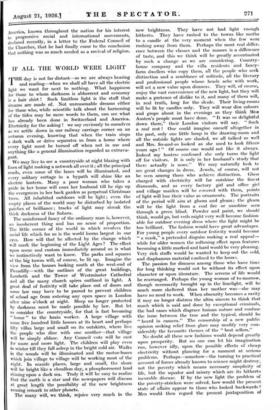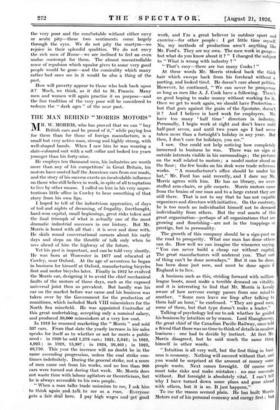IF ALL THE WORLD WERE LIGHT
THE day is not far distant—so we are always hearing and reading—when we shall all have all the electric light we want for next to nothing. What happiness for those to whom darkness is abhorrent and economy is a hair shirt ! Such limitless light is the stuff that dreams are made of. Not unreasonable dreams either for those who, while scientific talk about the harnessing of the tides may be mere words to them, can see what has already been done in Switzerland and America.
Electricity for the asking ! we say enviously to ourselves as we settle down in our railway carriage corner on an autumn evening, knowing that when the train stops a dark walk or drive separates us from a home where every light must be turned off when not in use and anything like a general illumination regarded as extrava- gant.
We may live to see a countryside at night blazing with lines of light making a network all over it; all the principal roads, even some of the lanes will be illuminated, and every solitary cottage in a bypath will shine like an electric lantern. Many a poor woman who takes a pride in her home will coax her husband till he rigs up the evergreens in her back garden as perpetual Christmas trees. All inhabited outdoors will be light; even the empty places of the world may be disturbed by isolated patches of brilliance ; tracks of light may streak the thick darkness of the Sahara.
The uninformed fancy of the ordinary man is, however, an incoherent thing and has no sense of proportion. The little corner of the world in which revolves the social life which for us is the world looms largest in our eyes. How will that be affected by the change which will mark the beginning of the Light Ages? The effect upon scene and custom immediately around us is what we instinctively want to know. The parks and squares of the big towns will, of course, be lit up. Imagine the view from the houses looking south at the west-end of Piccadilly—with the outlines of the great buildings, Lambeth and the Tower of Westminster Cathedral and all the many church spires outlined in light. A great deal of festivity will take place out of doors and some law may have to be passed to prevent children of school age from entering any open space in London after nine o'clock at night. Sleep no longer protected by darkness must be made possible by law. But let us consider the countryside, for that is fast becoming " home " to the brain worker. A large village with some five hundred little houses at its heart and perhaps fifty villas large and small on its outskirts, where live the people who dine with one another—that village will be simply ablaze. Any Council vote will be cast for more and more light. The children will play even in winter till they fall asleep in the bright cold air. Walks in the woods will be illuminated and the motor-buses which join village to village will be working most of the night. In seaside places, large and small, the shore will be bright like a cloudless day, a phosphorescent land Shining upon a dark sea. Truly it will be easy to realize that the earth is a star and the newspapers will discuss at great length the possibility of the new brightness causing remark in other planets.
The many will, we think, rejoice very much in the new brightness. They have not had light enough hitherto. They have rushed to the towns like moths to a candle at the very moment when the few were rushing away from them. Perhaps the most real differ- ence between the classes and the masses is a difference of taste, and this we think will be greatly accentuated by such a change as we are considering. Country- house company and the villa residents and fancy- farm dwellers who copy them, all the people who seek distinction and a semblance of solitude, all the literary and professional people whose heads ache with work, will set a new value upon dimness. They will, of course, enjoy the vast convenience of the new light, but they will make a pretence of dislike to it, and many of them will, in real truth, long for the shade. Their living-rooms will be lit by candles only. They will wear dim colours and grope about in the evenings as they think Miss Austen's people must have done. "It was so delightful down there," their London visitors will say. "Such a real rest ! One could imagine oneself altogether in the past, only one little lamp in the drawing-room and all the outside lights are shaded, we all talked so well and Mrs. So-and-so looked as she used to look fifteen years ago ! " Of course one would not like it always. Indeed my hostess confessed she only turns the light off for visitors. It is only in her husband's study that there actually is none." We may naturally look to see great changes in dress. Jewels, of course, will not be seen among those who achieve distinction. Glass charged with electricity will far outshine the finest diamonds, and as every factory girl and office girl and village maiden will be covered with them, points of light will lose their value as ornaments. The portraits of the period will aim at gloom and gleam; the gleam will be the light from a coal fire or sunshine seen through a green blind. Powder and paint, we should think, would go, but veils might very well become fashion. able for outdoor evening dress where the light might be too brilliant. The fashion would have great advantages. For young people every outdoor festivity would become "a mask," a pretended disguise making a real appeal— while for older women the softening effect upon features becoming a little marked and hard would be very pleasing. Very rich stuffs would be wanted to keep out the cold, and diaphanous material confined to the house.
The passion for dimness among those who have time for long thinking would not be without its effect upon character or upon literature. The screens of life would be rearranged. Perhaps the young woman of to-morrow, though necessarily brought up in the limelight, will be much more sheltered than her mother was—she may have no need to work. When obscurity becomes a rarity it may no longer distress the ultra sincere to think that much which is said and done by exceptional criminals, the bad cases which disgrace human nature and confuse the issue between the true and the typical, should be "heard in camera." The censorship of a new public opinion seeking relief from glare may modify very con- siderably the favourite themes of the "best sellers."
No doubt all these new fashions would depend greatly upon prosperity. But no one can let his imagination run, however idly, upon the possible effects of cheap electricity without glancing for a moment at serious problems. Perhaps—somehow—the turning to practical account of forces already known to science might destroy, not the poverty which means necessary simplicity of life, but the squalor and misery which are its hitherto incurable disease. If by the new light the problem of the poverty-stricken were solved, how would the present state of affairs appear to those who looked backwards ? Men would then regard the present juxtaposition of the very poor and the comfortable without either envy or acute pity—these two sentiments come largely through the eyes. We do not pity the martyrs—we rejoice in their splendid qualities. We do not envy the rich men of Rome—we are inclined to feel an even undue contempt for them. The almost uncontrollable sense of repulsion which squalor gives to some very good people would be gone—and the comicality which many rather bad ones see in it would be also a thing of the past.
How will poverty appear to those who look back upon it? Much, we think, as it did to St. Francis. Many men and women will again practise it on purpose—and the fine tradition of the very poor will be considered to redeem the "dark ages" of the near past.



































 Previous page
Previous page